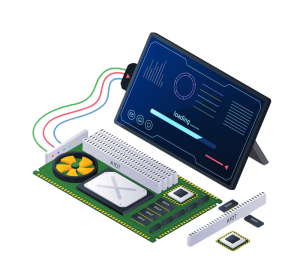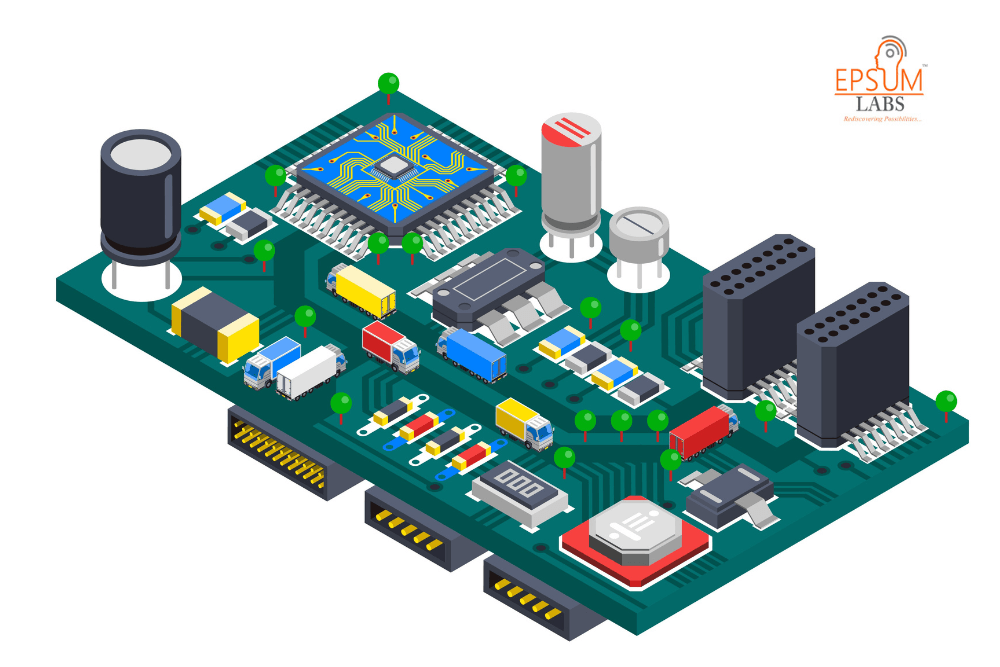Embedded systems surround us. They work silently in the background and are behind the smooth, safe, and easy modern life.
They power everything from smartphones to automobiles, smart home devices to medical devices. But what is an embedded system? How do such complex solutions impact our life? Let’s find out.
Contents
What is an Embedded System?
An embedded system is a combination of hardware and software that provides a specific function or set of operations within a larger system. What makes these systems so much more efficient and reliable than the general-purpose computer is that they are custom-fit for a particular use.
They are mostly driven by microcontrollers or microprocessors, and most of the time, they consist of custom-built embedded software that describes how the system works.
They range from simple automotive applications to industrial gear, medical devices, home appliances, wearable technology, and much more.
Now embedded systems are so widespread that they are an integral part of the technical infrastructure around us.
How Embedded Systems Impact Our Daily Life!
Such systems today have a stronger impact on almost every aspect of our life. For example:
Automotive Industry
Now, many automotive systems have been integrated with vehicles. These include airbags, information display, and even self-driving technology. They enable security, efficiency, and a much better driving experience.
Smart Home Devices
These include smart thermostats, security cameras, voice assistants, and much more, all of which possess embedded systems that guarantee continuous communication and responsiveness.
Healthcare Industry
Others are used in medicine. For instance, life-saving pacemakers and medical image diagnostics: they enable remote control and monitoring, diagnosis, and even remote surgery.
Consumer Electronics
These integrated technologies are highly relied upon by popular consumer electronics to work – smartphones, gaming consoles, and fitness trackers.
Embedded systems play an important role in the processing of data as well as in managing hardware components that guarantee smooth user experiences across different types of appliances.
Industrial Automation
Embedded systems play a very vital role in industrial applications. They are embedded in robots, and production line control devices use sensor-based monitoring devices.
Therefore, the implementation of such embedded systems can considerably enhance speed and accuracy in production processes of a factory.
This technology helps achieve more efficient automation, control, and monitoring in a real-time setting in factories, thereby helping to advance productivity and quality control measures in manufacturing operations.
What embedded software development does?

Every smart gadget relies on embedded software to operate. It is a specialized discipline where developers write programs for devices with very low resources.
Unlike traditional software development, embedded programming is sensitive to the optimization required so that the devices could work under hardware constraints efficiently.
Most of the modern embedded systems require responding in real time. That is where RTOS can help.
A Real-Time Operating Systems (RTOS) ensures that the tasks are completed within their respective time frames, and that is crucial for, say, medical equipment or the car’s safety system.
Some engineers specialize in embedded software, which is basically designing, testing, and refining the software to work well with the hardware. For instance, our Embedded software engineers may design an app for a smart thermostat or upgrade the firmware in a fitness tracker.
Importance of PCB Designing in Embedded Development:
PCB (Printed Circuit Board) designing is one of the critical development steps in the process for reliable embedded systems. It helps ensure that all the pieces involved within an integrated circuitry work cohesively. This is a small IoT device to massive medical instruments-the PCB forms the basis of the system.
The PCB design indeed impacts upon the performance, size, as well as long life of an embedded system. That is why this becomes such an important component to embedded development.
Embedded Software Testing: Why Does It Matters?
No embedded system is complete without significant testing. Such a process ensures that a system functions as expected and meets specifications in performance.
It checks the system’s how hardware and software communicate to identify defects, checking whether a system functions correctly at different conditions.
This is very crucial in sectors like health and car systems because failure of a system can be disastrous. Testing also ensures that gadgets meet the minimum standards of the industry, hence making them more secure and dependable.
Future of Embedded IT Solutions
The role of embedded systems is likely to become even more and more common with technology development. Embedded IT solutions will drive industry-wide innovation from smart cities to self-driving automobiles.
AI, machine learning, and IoT advancement will break all the barriers of embedded systems, thereby giving developers and engineers new opportunities.
Wrapping Up
Want to develop an embedded system for your business? Epsum Industry Pvt. Ltd. specializes in the full development of embedded software, PCB design, and all embedded application solutions.
We give the real-time system or software testing for peak performance. Let our team of skilled embedded software engineers help you. From concept development to delivery, we assist in bringing ideas to reality with creative solutions uniquely adapted to your requirements. Contact us today and discover how we might help shape the future.




